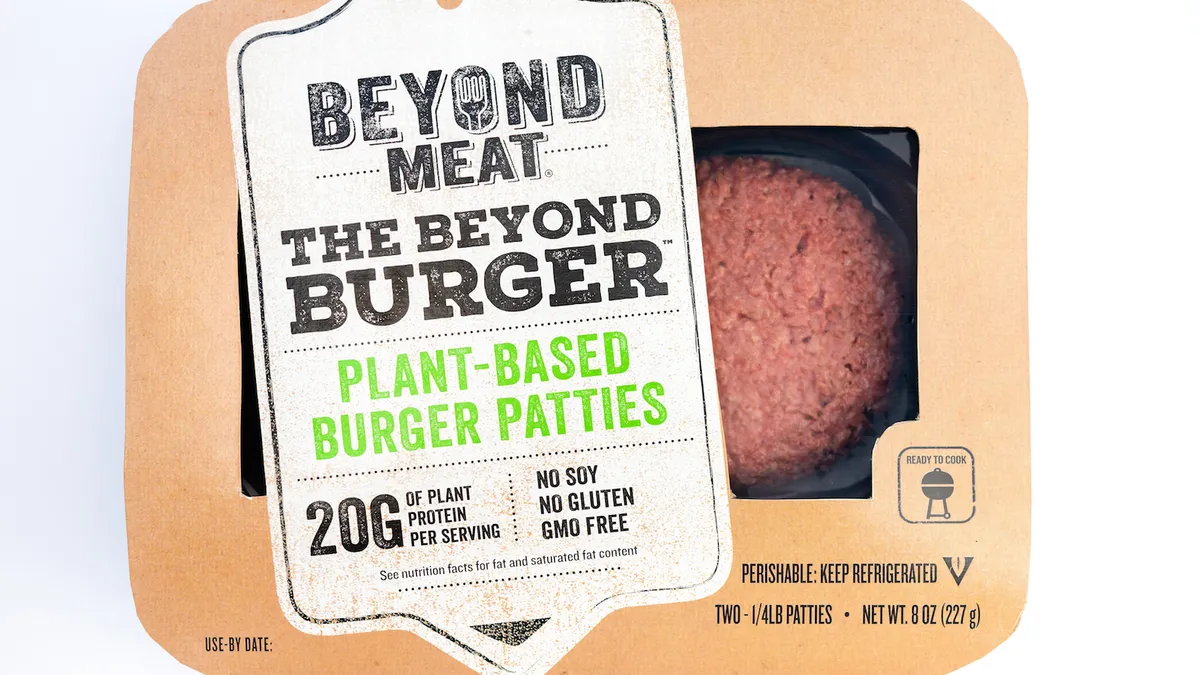Dive Brief:
- Sales of plant-based foods jumped 20% in the past year to more than $3.3 billion, according to Bloomberg, citing data from Nielsen and the Plant Based Foods Association. Non-dairy milk sales rose 9% year over year to $1.6 billion, making it the largest sector within the category. Plant-based creamers are up 131%, cheeses are up 43% and yogurts went up 55%. Meanwhile, sales of cow’s milk dropped 6%.
- Plant-based meat alternatives also saw a jump, totaling $670 million in sales — up 24% compared to 6% last year, the report says. Animal meat sales, on the other hand, grew about 2% in the same time period.
- Bloomberg states that larger food corporations are joining the trend, including Campbell's who sells a protein milk using a pea-based dairy alternative.
Dive Insight:
As plant-based foods make a strong push from fringe to mainstream, the food industry is adjusting. For the meat and dairy producers, the shift means time to fight back. Sen. Tammy Baldwin of Wisconsin last year introduced the Dairy Pride Act, asking the FDA to endorse a rule reserving the word “milk” for products made from one or more lactating cows. But as the Minneapolis Star-Tribune reported, the FDA has been somewhat hands-off in the growth of nondairy milk products because consumers do not seem confused by the term “milk” used for products made from almonds or oatmeal. These terms were made to help consumers, not as a way for industries to protect themselves from competition.
Rather than fight, some food companies are determining how to capitalize on the trend as consumers seek out healthy meat and dairy alternatives. According to HealthFocus International data, 17% of U.S. consumers aged 15 to 70 currently claim to eat a predominately plant-based diet, while 60% report to be cutting back on meat-based products. Tyson Food, for example, took a 5% stake in Beyond Meat in 2016, the first time a major meat company invested in a plant protein-based company. Tyson Ventures subsequently hiked that initial 5% stake by participating in another capital financing round. The plant-based foods industry is projected to hit $5.2 billion by 2020, likely putting Tyson Food's financial involvement in a much clearer and more profitable perspective.
That could be a smart move as plant-based meat producers like Beyond Meat and Impossible Burger have made plant-based proteins more palatable than ever. Beyond Burger has changed the market for meat equivalents by offering a product that strongly resembles a real beef patty. The burgers are pink in the middle, and even ‘bleed’ and sizzle on the grill. The life-like feel and taste of the burger has allowed it to nab meat eaters. In fact, 70% of people buying the plant-based burger are carnivores. Today, Beyond Meat is found in more than 10,000 grocery stores — including Kroger, Safeway, Publix and Whole Foods — and 10,000-plus restaurants about 2 years after it launched.
The growth is also a driver for Beyond Meat's announcement this week that it was opening a new 26,000-square foot research and development center, seven times the size of its former R&D space, Nosh reported. The new site will also serve as the base for the company’s “Manhattan Beach Project,” a group of scientists, engineers, food technologies, chefs and managers will work together to develop plant-based meats.
Sales of plant-based protein alternatives make up a relatively small portion of the food market. The new data shows about 13% of “milk” sales are non-dairy products. But as shoppers continue to search for healthier and cleaner protein sources, it likely is a trend that won’t dip soon.








